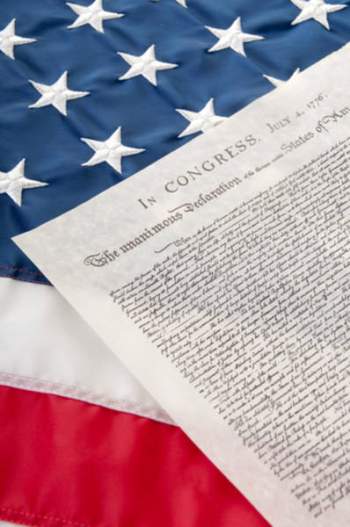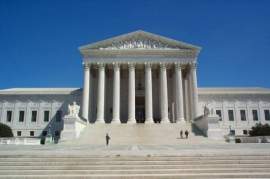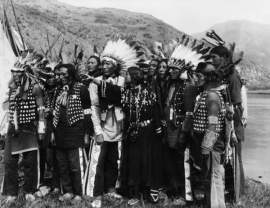
The Bill of Rights Amendments

Popular In Constitution
Purpose Of Lifetime Appointment And Pros And Cons Enumerated Powers Bicameral Legislature Background Article 3 Of The Constitution We The People 1st Amendment Who Wrote The Constitution Judicial Review Equal Protection Clause 5th Amendment 10th Amendment Three Fifths Compromise
Although created over 200 years ago, the Bill of Rights is still incorporated into America's legal system. Barron vs. Baltimore, a Supreme Court case from 1833 established a precedent that the Bill of Rights can only apply to the Federal Government. In the years following, other cases such as United States v. Cruikshank maintained the precedent established in 1833 and held that the First and Second Amendment of the U.S. Constitution did not apply to State or local governments.
Beginning in the early 1890s, however, the sentiments of the Supreme Court shifted. Numerous decisions involving cases that reflected Constitutional rights were interpreted through the 14th Amendment. Through the Due Process Clause established in the 14th Amendment, the Supreme Court ruled that the Bill of Rights is susceptible to inclusion against State governments.
Due process is a principle outlined in the 14th Amendment that forces the Federal Government to respect all legal rights awarded to an individual according to U.S. law. The Supreme Court has interpreted this Amendment as a direct extension of the Bill of Rights (and the entire Constitution) to all levels of Government. Although some of the Amendments outlined in the American Constitution are archaic, Due Process enables most of them to extend to all matters of the law.
The 1925 case of Gitlow vs. New York is regarded as the official genesis in regards to the incorporation of the Bill of Rights into State Constitutional law. During this case, Gitlow, an American citizen and member of the Socialist Party, was accused of criminal anarchy for his role in the publication of the "Left Wing Manifesto." The State court upheld the conviction citing clear and present danger as its justification, but the Supreme Court overturned the decision ruling that the First Amendment protected Gitlow's free speech and freedom of press rights. This case established perhaps the most important Amendment (freedom of speech) into everyday life.
The following list will detail the Bill of Rights, how it pertains to Constitutional law, and various court cases which solidified its place in everyday society.
1st Amendment-Guarantees the establishment and free practice of religion, along with freedom of speech, and freedom of the press.
● Establishment of religion became introduced through the decision in Everson vs. Board of Education. In 1947, using the American Constitution as his justification, a New Jersey citizen and taxpayer fought against a State law that authorized payments to school boards as a form of reimbursement for transportation costs. Of the schools who benefited, more than 96% were found to be private parochial Catholic Schools. Everson successfully argued that New Jersey violated the First Amendment by unfairly excluding other non-Catholic schools from receiving State funding.
● Freedom of speech is offered to all citizens and enables Americans to express themselves without censorship or limitation. Established by the previously mentioned Gitlow vs New York, freedom of speech will be upheld in all Constitutional law cases.
● Free practice of religion was established in the 1940 Supreme Court case of Cantwell vs. Connecticut. Newton Cantwell, a Jehovah's Witness, was attempting to espouse his religious beliefs in a highly Roman Catholic neighborhood in Connecticut. Cantwell and his two sons were going door to door with pamphlets and books attempting to convert the citizens of the community. Cantwell and his two sons were arrested and charged with illegal solicitation and a breach of the peace. The Court administering the case ruled that Cantwell was not in violation of any wrongdoing for he was under protection of the 1st and 14th Amendments.
2nd Amendment
The right to bear arms is arguably the most controversial Amendment in the American Constitution. Under Constitutional law, the interpretation has varied from an individual right to an archaic liberty that only benefits militias.
3rd Amendment
Freedom from quartering soldiers is not that relevant by today's standards and has not been incorporated with State Constitutional law.
4th Amendment
Protects individuals from unreasonable search and seizure. The 4th Amendment in the American constitution also requires law enforcement agencies to obtain a warrant or possess unreasonable doubt before entering an individual’s private property.
5th Amendment
Offers an individual the right to indictment by a grand jury; protects an individual from double jeopardy, self-incrimination, and the taking of private property without just compensation.
6th Amendment
This Amendment is present in all trials or court cases in America. The 6th Amendment in the American Constitution guarantees an individual the right to a fair, speedy, and public trial. The 6th Amendment also enables an individual to have legal assistance, regardless of the charge, and the right to confront adverse witnesses and notice of accusations. These rights are given to all men or women under trial for any sort of wrongdoing. They establish the "innocent until proven guilty" mantra that is present in the United States legal system.
7th Amendment
Offers individuals the right to a jury trial during civil court cases.
8th Amendment
Protects individuals from the Government imposing excessive bail and excessive fines during pending trials. The 8th Amendment in the American Constitution also protects individuals from cruel and unusual punishment for acts committed. Under this Amendment American citizens are free from torture, humiliating punishments, or punishments which degrade a human being.
9th Amendment and 10th Amendment
Due to their broadness and repetitive nature, these particular Amendments do not necessarily apply to Constitutional law.
NEXT: The English Bill of Rights and United States Bill of Rights




















